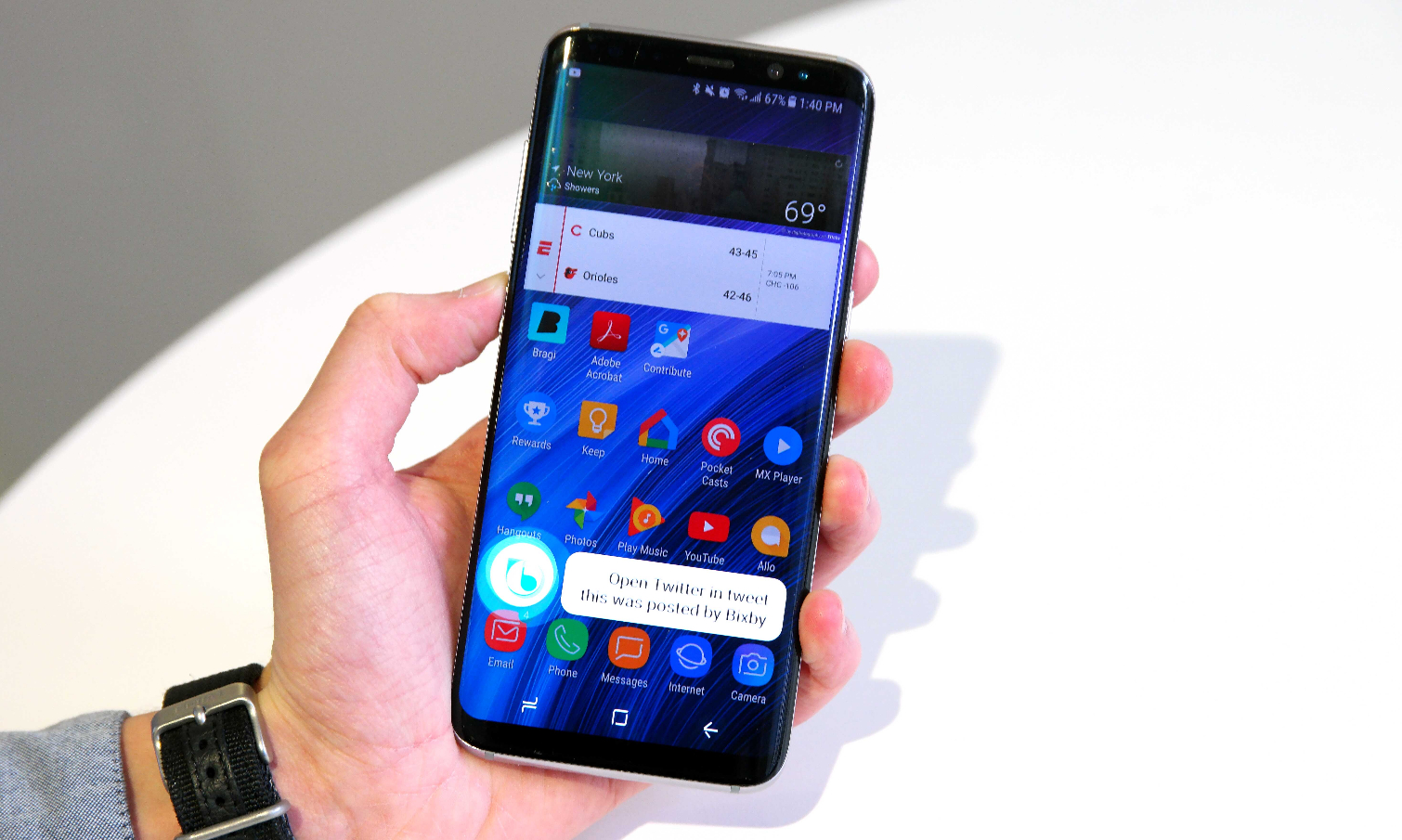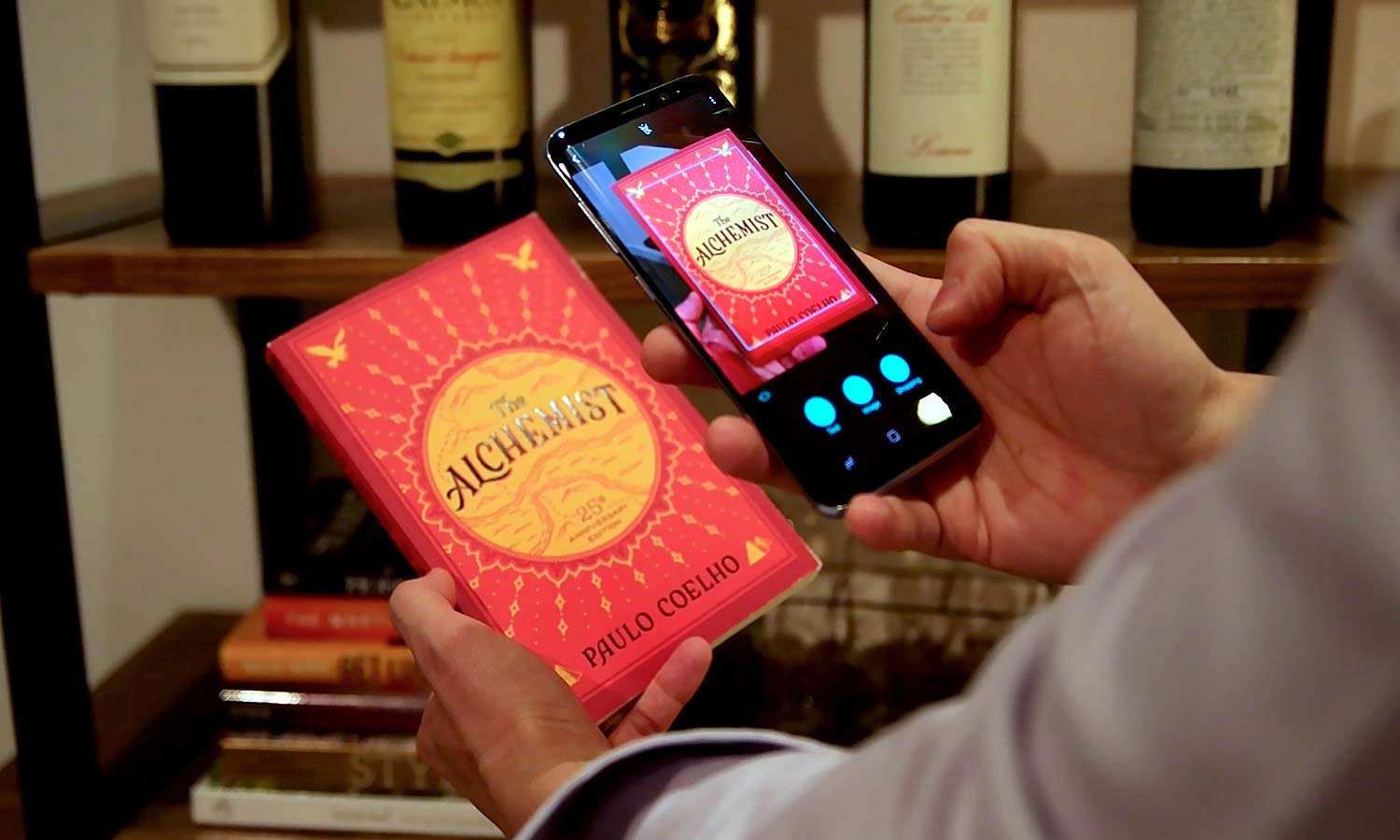Samsung’s Bixby Is the Right Solution to the Wrong Problem
Bixby is now ready for the Galaxy S8. But the digital assistant seems made to solve Samsung’s problems, not yours.

After missing the big Galaxy S8 launch this spring and then spending some time in beta, the Bixby Voice features for Samsung’s digital assistant have finally arrived in the U.S., available now as software update for the Galaxy S8 and S8+. Early reviews have been mixed: There were lots of issues when the beta began, and they seem mostly unresolved.

Including sexist hashtag descriptions of the male and female voices aren’t helping, though Samsung is addressing that issue.
But Bixby has problems beyond the fact that it’s somewhat slow and unreliable. It’s fundamentally flawed in its approach to artificial intelligence as a tool. Samsung is trying to solve problems with Bixby, but they aren’t the problems the phone maker should be solving.
MORE: Samsung Bixby: Tons of Potential, Still a Work in Progress
A good AI is like any other good tool — it lets you do more with less effort. A great AI assistant is an answer to the question, “how can the application of some intelligence allow the user to do more, faster and easier?” The whole point of machine learning, in the context of AI assistants, is to use your personal data (history, emails, location, contacts, whatever is appropriate) to provide context unique to you as an individual and ultimately predict what’s next.
For example: Let’s say I want to see if the gym I go to closes early on Saturday. If I asked an AI assistant “what time does the gym close?” I should get a contextual answer that makes sense for me personally. Looking at my location history or maybe billing emails, plus my current location, the assistant could know exactly which gym I’m talking about, check the hours of operation for today and come back with an answer like, “Crunch Gym on Greenback Lane closes at 7 p.m. today.” That’s much faster and easier than typing in a search query, finding the right gym, and tracking down the operating hours.
A better AI assistant would prompt me: “Hey if you want to make it to the gym three times this week, you better leave the house within the next hour. It closes at 7 p.m. today.”
An even better AI would preempt this question. It would know from my location history that I go to the gym three times a week and stay there for an hour. It could then see that I have only gone twice this week, and it’s 4:30 p.m. on Saturday. It would then prompt me. “Hey if you want to make it to the gym three times this week, you better leave the house within the next hour. It closes at 7 p.m. today.” That’s the potential for AI assistants on our phones: to perform useful and personal tasks without having to be explicitly told what to do, like getting a reminder you never even knew to set.
Get instant access to breaking news, the hottest reviews, great deals and helpful tips.
In its present form, Bixby Voice does none of this. It’s not even trying to. For the most part, it’s trying to replace tapping with speaking as a means of interacting with apps. That can be useful, as Avi Greengart, a research director for consumer platforms and device at GlobalData, notes. “If you want to change the screen timeout, you have to know where to find [that setting],” Greengart says of a task that Bixby is designed to handle. The flipside to that, Greengart quickly adds, is that the voice command has to work, too, and that hasn’t been the case with early versions of the assistant.
“Even at what Samsung is trying to do, it still has tremendous challenges,” Greengart says.
So Bixby’s focus on voice commands makes it different from Siri, Cortana or Google Assistant. But it seems built to be different solely to answer the marketing department’s question, “how does our thing stand out?” rather than because this different approach is more valuable to users.
Bixby is for Samsung, not you
Samsung desperately wants its own ecosystem. It has its own operating system (Tizen), and a whole mess of smart home gadgets and appliances that work together. But it hasn’t been able to own the ecosystem where it counts the most — on phones. There, it’s beholden to Android, and though the phone maker does its best to build its own interface and features and apps that duplicate all of Google’s, Samsung still can’t realistically sell a phone with it’s own OS instead of Google’s.
Now pundits are predicting that AI is the next big platform, and Samsung will be damned if it’s going to miss the boat and be stuck piggybacking on someone else’s ecosystem again.
And so it broke out the checkbook last year and bought Viv, an AI company founded in 2014 by the principal inventors of Siri (who left a couple years after Apple bought Siri). That same year, Samsung bought SmartThings for $200 million when smart home gadgets were the new frontier, and it saw this as a way to quickly claim a part of a critical future market.
Samsung’s interest is not in making the best Android phone, but in making the best Samsung phone.
In other words, Samsung’s interest in AI isn’t about solving a problem no other company is solving. It’s about making sure there’s a Samsung version of a thing everyone is going to be using in a few years. It exists for the same reason Samsung loads up its phones with its own web browser, image gallery, email app, SMS app, clock app, and calendar app — not because the Google apps aren’t good enough, but because they’re Google’s and not Samsung’s.
Samsung’s interest is not in making the best Android phone, but in making the best Samsung phone (that happens to run Android because nobody would buy a phone without access to all those Android apps).
A long way to go
The Bixby Voice assistant can do a few general things like setting reminders, but it’s not really aimed at providing answers to general knowledge questions (“How old is Bradley Cooper”) or preemptively predicting what you’re going to need to do next. Rather, it’s focus is on letting you control your phone with your voice.
The world’s most advanced voice-control accessibility feature does not make for a great AI assistant.
In the supported apps (did I mention apps be updated to support it?), you can tell Bixby to do almost anything you can do with taps and swipes. That’s a fantastic achievement in accessibility for some users and a potential time-saver for others, but it’s not that game-changing for everyone else. Staring at an image in the gallery app and saying “rotate this photo to the right” isn’t easier or faster than tapping an interface element to do it. “Post this photo to Twitter” isn’t a big step up from just tapping the share button and then the Twitter icon. Even if Bixby Voice worked flawlessly, the utility of taking a smartphone (whose entire design evolution is built around touch) and operating it with your voice is limited.
Samsung will continue to improve Bixby. It has to; the company’s all-in. Samsung even put a hardware button on its latest flagship phone and prohibited you from mapping it to anything else, because Samsung needs Bixby to become A Thing. That maximizes the chances the people will use Bixby, says Greengart, who also notes that if the assistant doesn’t work properly, they won’t be inclined to come back and see if there are any improvements in a few months’ time, button or not. And right now, Samsung’s assistant is just so far from being “dedicated hardware button” ready.

The image recognition component of Bixby Vision is terribly inaccurate, app support for the voice control component is limited, speech recognition is a big step behind Google Assistant or Siri, and the whole thing is ponderously slow. Even as those things improve, Samsung will have to greatly expand the entire idea of what Bixby is even supposed to be. The world’s most advanced voice-control accessibility feature does not make for a great AI assistant.
As it exists today, Bixby is not the future, it’s the past. It’s about providing duplicative ways to do things you already do with your phone instead of making your phone an intelligent partner that does things you couldn’t easily do before. More to the point, its current iteration seems to exist so that Samsung isn’t left out of the supposed next great ecosystem battle — AI assistants — as it was on the mobile operating system race.
 Club Benefits
Club Benefits





